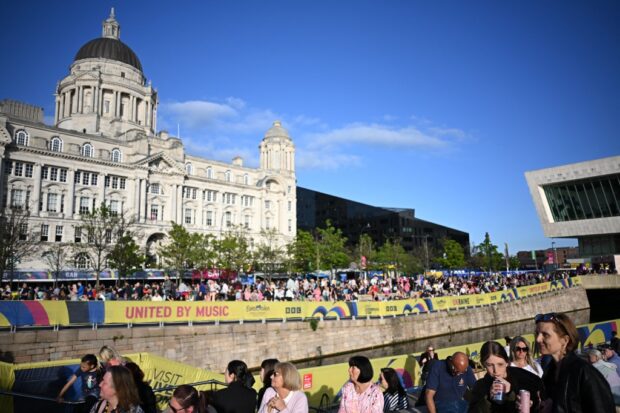26 nations to vie for glass microphone trophy in Eurovision grand final on May 13

People gather in the Eurovision village at Pier Head on the eve of the final of the Eurovision Song Contest 2023 at the M&S Bank Arena in Liverpool, northern England, on May 12, 2023.
PAUL ELLIS / AFP
LIVERPOOL, United Kingdom—Twenty-six countries, each with three minutes to convince juries and the voting public: Britain hosts the Eurovision grand final on Saturday night on behalf of last year’s runaway winners Ukraine.
The heavily tattooed and plant pot hat-wearing Kalush Orchestra took away the coveted glass microphone trophy with their hip-hop/folk music mash-up “Stefania” last time round.
But Russia’s invasion ended Ukraine’s hopes of staging the contest and welcoming legions of frenetic Europop fans to the country, forcing organizers to look elsewhere for a venue.
Liverpool—home of The Beatles, giants of world music and also Atomic Kitten—stepped in, turning the city in northwest England a sea of yellow and blue for a week-long build-up.
“While the eyes of the world will be on Liverpool this weekend for Eurovision, our hearts will be with the people in Ukraine who are fighting for their sovereignty and survival,” Britain’s Culture Secretary Lucy Frazer said.
Article continues after this advertisement“If there was any justice this final would be taking place in Kyiv but we are honored in the UK to be able to host this event on their behalf and to welcome legions of fans and media.”
Article continues after this advertisementUkraine’s entry this year is “Heart of Steel,” an electro-pop offering by the band Tvorchi inspired by the siege of the Azovstal plant in Mariupol.
During last year’s contest, Kalush Orchestra singer Olef called from the stage: “Please help Ukraine, Mariupol. Help Azovstal right now.”
But bookmakers are not predicting a second successive win.
Favorite going into the climax of a week of celebrations and preliminary rounds is Sweden’s Loreen, with her offering “Tattoo.”
Loreen previously won in 2012. If she emerges victorious, she will join Ireland’s Johnny Logan as the only other two-time winner.
Scandinavian stand-off?
Rapper Kaarija, representing Finland, is second favorite, with his offering “Cha Cha Cha,” which the BBC described as “an intoxicating blend of industrial metal and hyperpop.”
He would be the first Finnish winner since the monstrously disguised heavy metal band Lordi’s “Hard Rock Hallelujah” in 2006.
Eurovision would not be Eurovision without the outlandish, and Croatia’s extravagantly moustached Let 3 would likely win that category—if there were one.
Their song “Mama SC”—a veiled attack on Russia’s Vladimir Putin and “human stupidity”—was described by British gossip site Popbitch as “an absolute cacophony (in the best possible way).”
“We are the soldiers of love, we have the uniform of the army of love,” the band declared this week from under their leather-peaked military caps.
This year’s final, taking place in front of 6,000 screaming fans at the Liverpool Arena, was overshadowed on Friday by a political row over a proposed appearance by Volodymyr Zelensky.
The European Broadcasting Union refused an invitation for the Ukrainian president to send a message, for fear of politicizing the event, despite the message of some of the songs—and a perennial whinge about tactical voting.
That prompted criticism from the UK government.
“The values and freedoms that President Zelensky and the people of Ukraine are fighting for are not political, they’re fundamental,” Prime Minister Rishi Sunak’s official spokesman told reporters.
“Eurovision themselves recognized that last year when they rightly suspended Russia’s participation from the competition.” /ra
RELATED STORIES:
Zelensky not allowed to address Eurovision final—organizers
British PM Rishi Sunak ‘disappointed’ at Eurovision ban on Zelensky message